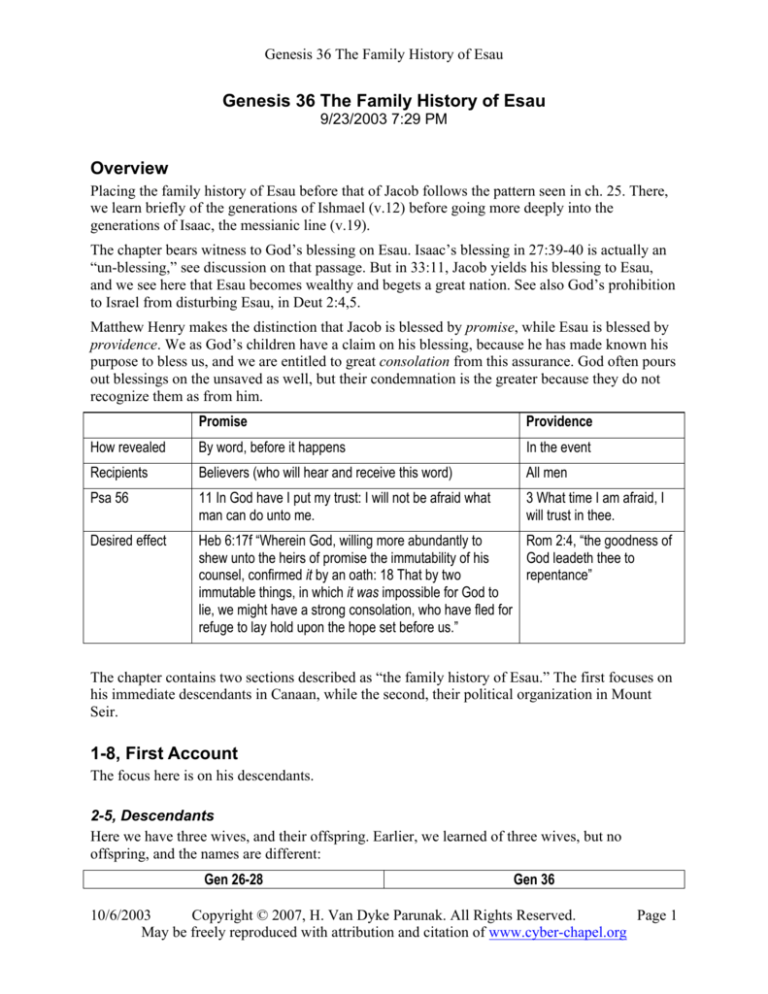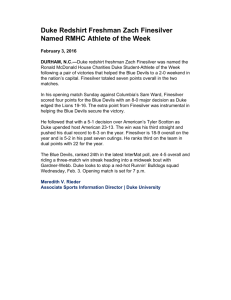
Genesis 36 The Family History of Esau
Genesis 36 The Family History of Esau
9/23/2003 7:29 PM
Overview
Placing the family history of Esau before that of Jacob follows the pattern seen in ch. 25. There,
we learn briefly of the generations of Ishmael (v.12) before going more deeply into the
generations of Isaac, the messianic line (v.19).
The chapter bears witness to God’s blessing on Esau. Isaac’s blessing in 27:39-40 is actually an
“un-blessing,” see discussion on that passage. But in 33:11, Jacob yields his blessing to Esau,
and we see here that Esau becomes wealthy and begets a great nation. See also God’s prohibition
to Israel from disturbing Esau, in Deut 2:4,5.
Matthew Henry makes the distinction that Jacob is blessed by promise, while Esau is blessed by
providence. We as God’s children have a claim on his blessing, because he has made known his
purpose to bless us, and we are entitled to great consolation from this assurance. God often pours
out blessings on the unsaved as well, but their condemnation is the greater because they do not
recognize them as from him.
Promise
Providence
How revealed
By word, before it happens
In the event
Recipients
Believers (who will hear and receive this word)
All men
Psa 56
11 In God have I put my trust: I will not be afraid what
man can do unto me.
3 What time I am afraid, I
will trust in thee.
Desired effect
Heb 6:17f “Wherein God, willing more abundantly to
Rom 2:4, “the goodness of
shew unto the heirs of promise the immutability of his
God leadeth thee to
counsel, confirmed it by an oath: 18 That by two
repentance”
immutable things, in which it was impossible for God to
lie, we might have a strong consolation, who have fled for
refuge to lay hold upon the hope set before us.”
The chapter contains two sections described as “the family history of Esau.” The first focuses on
his immediate descendants in Canaan, while the second, their political organization in Mount
Seir.
1-8, First Account
The focus here is on his descendants.
2-5, Descendants
Here we have three wives, and their offspring. Earlier, we learned of three wives, but no
offspring, and the names are different:
Gen 26-28
Gen 36
10/6/2003
Copyright © 2007, H. Van Dyke Parunak. All Rights Reserved.
Page 1
May be freely reproduced with attribution and citation of www.cyber-chapel.org
Genesis 36 The Family History of Esau
26:34 Judith the daughter of Beeri the Hittite,
Bashemath the daughter of Elon the Hittite:
28:9 Mahalath the daughter of Ishmael, the sister
of Nebajoth,
Adah the daughter of Elon the Hittite,
Aholibamah the daughter of Anah the
(grand)daughter of Zibeon the Hivite;
3 And Bashemath Ishmael's daughter, sister of
Nebajoth.
How do these relate? Two possibilities, which may apply individually to each name.
• May be the same wives, with different names, and with the first two in reverse order to line
up Elon. Explanations exist for the changes in the names of Judith’s father and tribe as
well:
o “Hittite” is general term for “Canaanite,” which suits the point being made in
ch. 26, while “Hivite” is a more precise racial term, required in the genealogy of
ch. 36
o Anah could well have become called “the well man,” “Beeri,” as a result of his
discovery related in v.24 of this chapter.
• Or the earlier wives may have been childless, and he may have taken others, whose
offspring are related here. Since the point of the current chapter is genealogy, there is no
need to mention the barren wives.
Note the emphasis that these offspring were born to him “in the land of Canaan,” as we have just
been reminded that Jacob’s were born to him “in Padam-Aram” (35:26). God’s promise to give
the land to Jacob does not align with the natural arrangement, and must be claimed by faith.
Esau is deliberately polygamous, yet has only five sons (and unspecified daughters, v.6). Jacob,
who had no desire for multiple wives, has twelve sons. We see the superiority of God’s promise
(28:3, 14) over fleshly effort.
6-8, Migration to Seir
The separation of Esau from Jacob is reminiscent of the separation of Lot from Abraham in ch.
13. We see the material blessing of God on both parties, but also the willingness of Esau (like
Lot) to leave the land of promise. Though Jacob is willing to yield the blessing to him (33:11),
Esau does not treasure the land that God has given them. In fact, we know from 32:3 that even
during the 40 years that Jacob was in Haran, Esau did not stay in the land of promise, but had
already departed for Seir. Thus we see again Esau’s fundamental weakness: he does not treasure
the things of God. This was manifested in his despite for the birthright in ch. 25 (and the role of
family spiritual leader that it entailed), and now for his despite for the land of promise. His
affection is not on things above (Col 3:2).
9-43, Second Account
This much longer account deals with subsequent generations in the land of Seir (as v.9
emphasizes), and their relations with the indigenous inhabitants of the land. Overview:
• 10-19 focuses on Esau, and how his sons became family leaders. Notice the summary at
v.19, calling our attention to the parallel between “sons” and “dukes.”
10/6/2003
Copyright © 2007, H. Van Dyke Parunak. All Rights Reserved.
Page 2
May be freely reproduced with attribution and citation of www.cyber-chapel.org
Genesis 36 The Family History of Esau
• 20-30 turns to the indigenous peoples, and the same relation there (sons and family
leaders), as the summary in v. 20-21 shows.
• 31-43 returns to Esau, and again deals with two categories, this time the kings (31-39) and
the dukes (40-43).
So the driving theme of this section is the political organization of Edom. We shall see that in
this organization, Esau follows the lead of the world.
10-19, Esau
v.19 is the summary, calling our attention to what we should learn here: that Esau’s sons and
grandsons became “dukes.”
• 10-14 summarizes the (grand)sons of Esau, going one generation farther than did vv. 1-8.
• 15-18 recognizes these offspring as tribal chieftans, the heads of extended clans.
The word “duke” deserves our attention. It is derived from the word meaning “thousand,” and is
generally understood to be “leader of a thousand,” a chiliarch. The term is only used of Edom,
with three exceptions in later writings of Israel (Zech 9:7; 12:5,6), and seems to be indigenous to
their culture. It may have a military meaning (cf. Roman “centurion,” leader of a hundred). Most
lexicons translate “tribal chieftan.” Where did Esau’s offspring learn this distinctive term?
20-30, Indigenous Peoples (Horites)
The next ten verses describe the indigenous people who occupied this region before Esau
arrived. They are called “Horites,” which strictly speaking is not the name of a racial or linguistic
group (like “Hivite”), but rather a descriptive term (“the cave dwellers,” “troglodytes”).
We have here the same twofold structure as in 10-19: first the sons are listed, then we are told
that they are tribal chieftans. Vv.20-21 serve the same purpose as 19, summarizing this twofold
structure: “these are the sons … these are the dukes.”
Notice the repeated structure:
• 20 identifies seven sons of Seir.
• 22-28 gives the next generation
• 29-30 describes these sons as tribal chieftans.
Deut 2:12, 22 tells us that the Horites inhabited Edom before Esau, and that God enabled him to
drive them out.
So this structure was there before Esau arrived, and though he supplanted them, he adopted their
tribal ruling structure from them. There is a strong parallel with Israel after the return from
Egypt, when they picked up the culture (in that case the idolatry) of the Canaanites even as they
drove them out. In Esau’s case, we do not know whether there was anything morally wrong with
the system of chieftans, but the fundamental dynamic is one of which we must beware: the world
is insidious, and will subtly draw us into its practices, even as we think we are victorious over it.
We must be ever on our guard.
10/6/2003
Copyright © 2007, H. Van Dyke Parunak. All Rights Reserved.
Page 3
May be freely reproduced with attribution and citation of www.cyber-chapel.org
Genesis 36 The Family History of Esau
Matthew Henry notes, “Titles of honour have been more ancient out of the church than in it.
Esau’s sons were dukes when Jacob’s sons were but plain shepherds, ch. 47:3. … There is an
honour that comes from God, and a name in his house that is infinitely more valuable. Edomites
may be dukes with men, but Israelites indeed are made to our God kings and priests.” 1
The chieftans are apparently named after the size of the group they command, while Israelite
terms of rank (“head” nasi’, “overseer” paqiyd, “elder” zaqen) describe their function toward the
group. The Edomite model is more that of Jethro in Exod 18:21. In a situation in which “two or
three” are valuable, we are better advised to focus on our function than on our size and prestige.
31-43, Esau
Once established in the land, Esau’s descendants adopted another example of the people around
them, in establishing a kingship. Just as 10-19 compares sons to chieftans, 31-43 compares
chieftans to kings.
31-39, Kings of Edom
See KD for the relation of these kings to the dukes in 40-43. Key points:
• Edom had dukes and kings contemporaneously: Exod 15:15 with Num 20:14.
• The kings are not dynastic. The list indicates a father and/or a city for each king: no father
is listed as being also a king, and no city appears twice. Each successive king is from a
different family.
• Perhaps the relation is that the dukes elected the kings. Note the geographical emphasis in
this description of the dukes, missing in the earlier description in 15-19. The dukes were
geographically distributed; perhaps the kingship
Timing: Edom had kings before Israel did. The reference may be to the future kings in the tmie
of Solomon and David (as is Moses’ reference to kings in Deut 17:14), or it may be to Moses’
function as “king in Jeshurun” (Deut 33:5). Matthew Henry: “God had lately promised Jacob
that kings should come out of his loins (ch. 35:11), yet Esau’s blood becomes royal long before
any of Jacob’s did. Note, In external prosperity and honour, the children of the covenant are
often cast behind, and those that are out of covenant get the start. … We may suppose it was a
great trial to the faith of God’s Israel to hear of the pomp and power of the kings of Edom, while
they were bond-slaves in Egypt; but those that look for great things from God must be content to
wait for them; God’s time is the best time.”2
40-43, Dukes
Leupold suggests that these should be place names rather than personal names. Compare with the
earlier list in 15-19.
1
Henry, M. 1996, c1991. Matthew Henry's commentary on the whole Bible : Complete and
unabridged in one volume . Hendrickson: Peabody
2
Henry, M. 1996, c1991. Matthew Henry's commentary on the whole Bible : Complete and
unabridged in one volume . Hendrickson: Peabody
10/6/2003
Copyright © 2007, H. Van Dyke Parunak. All Rights Reserved.
Page 4
May be freely reproduced with attribution and citation of www.cyber-chapel.org
Genesis 36 The Family History of Esau
15-19
duke Teman
duke Omar
duke Zepho
duke Kenaz
Duke Korah
duke Gatam
duke Amalek:
duke Nahath
duke Zerah
duke Shammah
duke Mizzah:
duke Jeush
duke Jaalam
duke Korah:
40-43
duke Timnah
duke Alvah
duke Jetheth
Duke Aholibamah
duke Elah
duke Pinon
Duke Kenaz
duke Teman
duke Mibzar
Duke Magdiel
duke Iram
So we should render each of these, “the duke of X,” rather than “duke X.” The picture is that the
chieftans rule in the various cities, with a king over the entire country, not hereditary, but
perhaps chosen by the chieftans.
Key Theme
Esau enjoyed naturally two of the things that God had promised Jacob.
• God promised Jacob tenancy of Canaan, yet his children were born in Haran, while Esau’s
were born in Canaan.
• God promised Jacob kingly descendants, yet Esau’s family led to kings “before there
reigned any king over the children of Israel.”
Yet two things set them apart: the promise of God, and the faith of Jacob receiving that promise.
• God grants these blessings to Esau by providence, not by promise; for a time, not
perpetually.
• Esau does not recognize God as the giver, and does not value these benefits, but (in the
case of the land) forsakes what he should have treasured.
As we take our leave of Esau, we would do well to recall the admonition in Heb 12:16, which
warns us against the profanity of Esau, in not valuing the things of God.
Analysis
1-8, First Account
1 Now these are the generations of Esau, who is Edom.
10/6/2003
Copyright © 2007, H. Van Dyke Parunak. All Rights Reserved.
Page 5
May be freely reproduced with attribution and citation of www.cyber-chapel.org
Genesis 36 The Family History of Esau
2-5, Descendants
2 Esau took his wives of the daughters of Canaan;
Adah the daughter of Elon the Hittite,
and Aholibamah the daughter of Anah the daughter of Zibeon the Hivite;
3 And Bashemath Ishmael's daughter, sister of Nebajoth.
4 And Adah bare to Esau Eliphaz;
and Bashemath bare Reuel;
5 And Aholibamah bare Jeush, and Jaalam, and Korah:
these are the sons of Esau,
which were born unto him in the land of Canaan.
6-8, Migration to Seir
6 And Esau took his wives, and his sons, and his daughters, and all the persons of his house,
and his cattle, and all his beasts, and all his substance,
which he had got in the land of Canaan;
and went into the country from the face of his brother Jacob.
7 For their riches were more than that they might dwell together;
and the land wherein they were strangers could not bear them
because of their cattle.
8 Thus dwelt Esau in mount Seir:
Esau is Edom.
9-43, Second Account
9 And these are the generations of Esau the father of the Edomites in mount Seir:
10-19, Esau
10-14, Grandsons
10 These are the names of Esau's sons;
Eliphaz the son of Adah the wife of Esau,
Reuel the son of Bashemath the wife of Esau.
11 And the sons of Eliphaz were Teman, Omar, Zepho, and Gatam, and Kenaz.
12 And Timna was concubine to Eliphaz Esau's son;
and she bare to Eliphaz Amalek:
these were the sons of Adah Esau's wife.
13 And these are the sons of Reuel; Nahath, and Zerah, Shammah, and Mizzah:
these were the sons of Bashemath Esau's wife.
14 And these were the sons of Aholibamah, the daughter of Anah the daughter of Zibeon,
Esau's wife:
and she bare to Esau Jeush, and Jaalam, and Korah.
15-18, Dukes
15 These were dukes of the sons of Esau:
the sons of Eliphaz the firstborn son of Esau;
duke Teman, duke Omar, duke Zepho, duke Kenaz, 16 Duke Korah, duke Gatam, and
duke Amalek:
10/6/2003
Copyright © 2007, H. Van Dyke Parunak. All Rights Reserved.
Page 6
May be freely reproduced with attribution and citation of www.cyber-chapel.org
Genesis 36 The Family History of Esau
these are the dukes that came of Eliphaz in the land of Edom;
these were the sons of Adah.
17 And these are the sons of Reuel Esau's son;
duke Nahath, duke Zerah, duke Shammah, duke Mizzah:
these are the dukes that came of Reuel in the land of Edom;
these are the sons of Bashemath Esau's wife.
18 And these are the sons of Aholibamah Esau's wife;
duke Jeush, duke Jaalam, duke Korah:
these were the dukes that came of Aholibamah the daughter of Anah, Esau's wife.
19, Summary
19 These are the sons of Esau, who is Edom,
and these are their dukes.
20-30, Indigenous Peoples (Horites)
20-21, Summary (sons and dukes)
20 These are the sons of Seir the Horite, who inhabited the land;
Lotan, and Shobal, and Zibeon, and Anah, 21 And Dishon, and Ezer, and Dishan:
these are the dukes of the Horites, the children of Seir in the land of Edom.
22-28, Sons
22 And the children of Lotan were Hori and Hemam;
and Lotan's sister was Timna.
23 And the children of Shobal were these; Alvan, and Manahath, and Ebal, Shepho, and
Onam.
24 And these are the children of Zibeon; both Ajah, and Anah:
this was that Anah that found the mules in the wilderness, as he fed the asses of Zibeon his
father. <<”mules” is a guess. The Jewish scholars attribute the invention of mules to him, but
“found” implies something that existed before he came across it, and there is a good word for
“mule” (prd) used in the Bible from the time of David on, and in the Ugaritic literature
contemporaneously with Moses. A better guess is “waters” or “hot springs,” which might
explain Anah’s alternative moniker Beeri in 26:34.>>
25 And the children of Anah were these; Dishon, and Aholibamah the daughter of Anah. 26
And these are the children of Dishon; Hemdan, and Eshban, and Ithran, and Cheran.
27 The children of Ezer are these; Bilhan, and Zaavan, and Akan.
28 The children of Dishan are these; Uz, and Aran.
29-30, Dukes
29 These are the dukes that came of the Horites; duke Lotan, duke Shobal, duke Zibeon, duke
Anah, 30 Duke Dishon, duke Ezer, duke Dishan:
these are the dukes that came of Hori, among their dukes in the land of Seir.
10/6/2003
Copyright © 2007, H. Van Dyke Parunak. All Rights Reserved.
Page 7
May be freely reproduced with attribution and citation of www.cyber-chapel.org
Genesis 36 The Family History of Esau
31-43, Esau
31-39, Kings of Edom
31 And these are the kings that reigned in the land of Edom,
before there reigned any king over the children of Israel.
32 And Bela the son of Beor reigned in Edom:
and the name of his city was Dinhabah.
33 And Bela died,
and Jobab the son of Zerah of Bozrah reigned in his stead.
34 And Jobab died,
and Husham of the land of Temani reigned in his stead.
35 And Husham died,
and Hadad the son of Bedad, who smote Midian in the field of Moab, reigned in his stead:
and the name of his city was Avith.
36 And Hadad died,
and Samlah of Masrekah reigned in his stead.
37 And Samlah died,
and Saul of Rehoboth by the river reigned in his stead.
38 And Saul died,
and Baalhanan the son of Achbor reigned in his stead.
39 And Baalhanan the son of Achbor died,
and Hadar reigned in his stead:
and the name of his city was Pau;
and his wife's name was Mehetabel, the daughter of Matred, the daughter of Mezahab.
40-43, Dukes
40 And these are the names of the dukes that came of Esau,
according to their families,
after their places,
by their names;
duke Timnah, duke Alvah, duke Jetheth, 41 Duke Aholibamah, duke Elah, duke Pinon, 42
Duke Kenaz, duke Teman, duke Mibzar, 43 Duke Magdiel, duke Iram:
these be the dukes of Edom,
according to their habitations in the land of their possession:
he is Esau the father of the Edomites.
10/6/2003
Copyright © 2007, H. Van Dyke Parunak. All Rights Reserved.
Page 8
May be freely reproduced with attribution and citation of www.cyber-chapel.org





